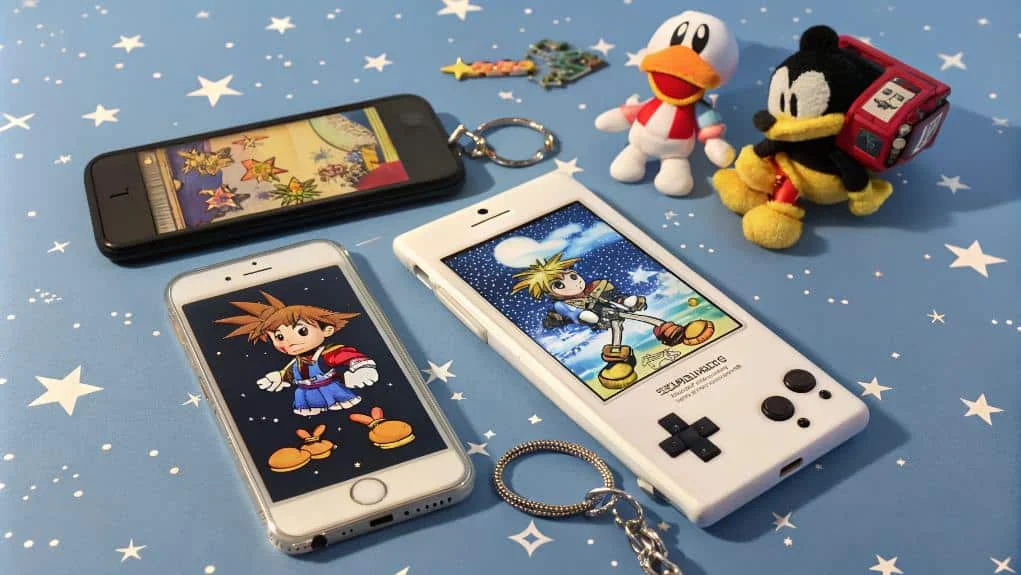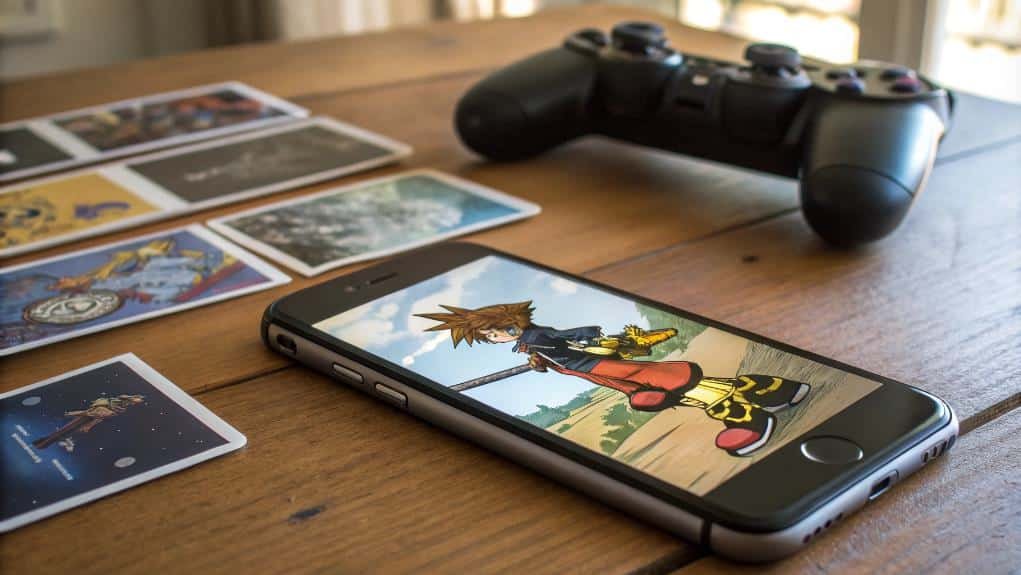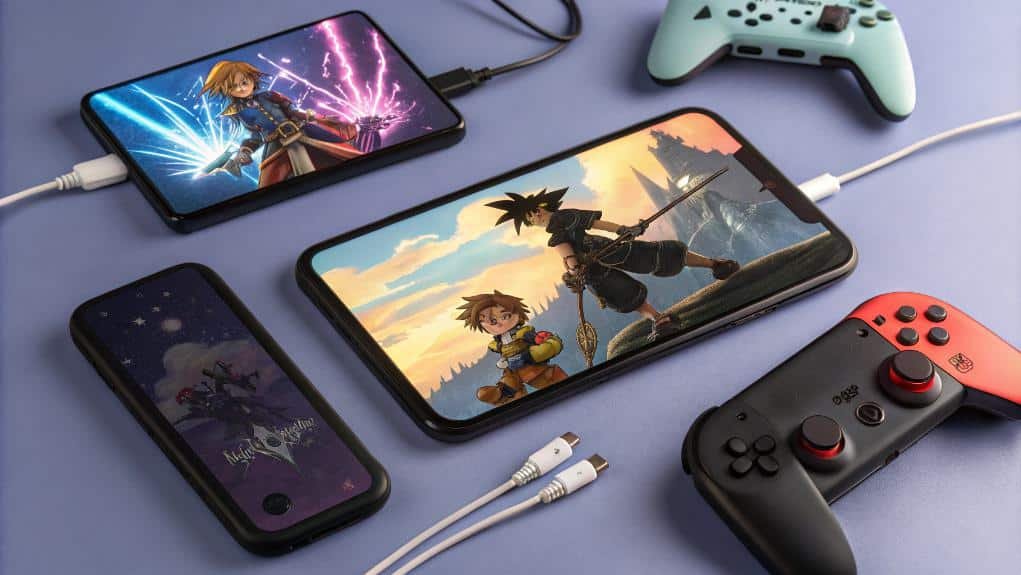The history of Kingdom Hearts on mobile devices began with the launch of Kingdom Hearts Mobile in 2008, blending social interaction with mini-games and rich lore. Designed for NTT DoCoMo's i-mode, the game introduced avatar customization and turn-based combat mechanics, keeping players engaged through a monthly content schedule. Although it faced criticism for pacing and gameplay simplicity, it left a lasting impact on mobile gaming and community engagement. Successors like Kingdom Hearts Unchained χ and Dark Road further expanded the narrative. As the franchise evolves, new titles promise to build on this legacy, creating exciting possibilities ahead.
Key Takeaways
- *Kingdom Hearts Mobile* launched on December 15, 2008, integrating gameplay with social interaction and mini-games for NTT DoCoMo's i-mode devices.
- The platform featured avatar customization, strategic turn-based combat, and a monthly release schedule to keep players engaged.
- The storyline explored themes of darkness and betrayal, expanding on the lore of the Kingdom Hearts universe through new characters and narratives.
- Community engagement strategies, including exclusive content and social features, fostered player interaction and a deeper connection to the Kingdom Hearts franchise.
- The discontinuation of the original mobile title in 2013 paved the way for future developments, such as *Kingdom Hearts: Missing-Link* and *Kingdom Hearts IV*.
Overview of Kingdom Hearts Mobile

Launched on December 15, 2008, Kingdom Hearts Mobile marked an ambitious foray into the mobile gaming landscape by Square Enix and Disney Mobile. Designed exclusively for NTT DoCoMo's i-mode devices, the game aimed to blend engaging game mechanics with social interactions, creating a unique online community.
Players could customize their avatars with various outfits, weapons, and items, which fostered individual expression within the virtual world. The gameplay included eight mini-games that drew from existing board and card games, providing diverse entertainment options. Moreover, the avatars could participate in mini-games and social activities, which were integral to the Avatar Kingdom experience.
Additionally, the integration with Kingdom Hearts coded allowed players to access new items by completing episodes, enhancing the connection between the two titles. This interactivity encouraged players to engage more deeply with both the mobile experience and the broader Kingdom Hearts narrative.
Social elements thrived in the Avatar Kingdom, where players could meet, chat, and collaborate with friends, emphasizing the importance of community in the gaming experience.
Despite its discontinuation in 2013, Kingdom Hearts Mobile left a lasting impact on mobile gaming, showcasing how game mechanics and social interactions could intertwine to create a memorable experience.
Key Features of the Game
Kingdom Hearts on mobile offers a rich array of features that enhance player engagement. Avatar customization options allow players to express their individuality, while a diverse selection of mini-games delivers additional entertainment and challenges. Exclusive content downloads further enrich the experience, ensuring that players have fresh material to explore as they navigate the enchanting worlds of the Kingdom Hearts universe. Additionally, players can enjoy a strategic combat system that revolves around turn-based mechanics, providing depth to battles against the Heartless.
Avatar Customization Options
Customization options play a pivotal role in enhancing the player experience within Kingdom Hearts mobile games. These games offer players a variety of avatar designs, allowing them to create unique identities within the Kingdom Hearts universe.
Early titles like Kingdom Hearts Mobile featured a range of customization options, including outfits, weapons, and accessories that players could earn by completing episodes in Kingdom Hearts coded. This integration rewarded players with new avatar outfits and backgrounds, enriching the gameplay experience.
As the series evolved, later games like Kingdom Hearts: Missing Link introduced even greater customization depth. Players now have access to detailed character creation systems that include features like a "change clothes" option and color sliders, providing extensive visual customization. In addition, the development team has confirmed that more customization options are expected upon full launch, further enhancing player creativity.
The user-friendly interface enhances the overall experience, making it easy for players to personalize their characters. Community feedback highlights a strong desire for more customization options across the series, with fans frequently discussing their hopes for wardrobe flexibility and intricate design features.
This ongoing evolution of avatar customization reflects the developers' commitment to enhancing player engagement and enriching the Kingdom Hearts experience.
Mini-Game Variety
The introduction of mini-games in Kingdom Hearts mobile titles adds an engaging layer of gameplay that appeals to a diverse audience. Launched on December 15, 2008, these mini-games initially included three offerings—KH Gummiship Studio, KH Card Struggle -Daifugō-, and KH Balloon Glider—each showcasing unique mechanics.
The mini-game evolution continued with five additional titles, featuring adaptations of existing board and card games, alongside original puzzle variations and rhythm challenges.
Players enjoyed ship customization in KH Gummiship Studio, while KH Card Struggle -Daifugō- and KH Pair Card Battle highlighted strategic card gameplay. Rhythm challenges like KH Balloon Glider offered a different flavor, engaging players through competitive gameplay.
The monthly release schedule guaranteed consistent player engagement, as new mini-games became available via the Kingdom Hearts Mobile portal. Moreover, the mini-games were part of a broader effort to expand the franchise into mobile gaming, showcasing the innovative spirit of the Kingdom Hearts series.
Additionally, these mini-games integrated seamlessly with Kingdom Hearts coded episodes, rewarding players with new avatar outfits upon completion. This connection not only incentivized gameplay but also influenced future titles, making the mini-games integral to the Kingdom Hearts experience.
Ultimately, the mini-game variety enriched the mobile offerings, appealing to both casual and dedicated fans of the franchise.
Exclusive Content Downloads
Exclusive content downloads in the mobile iteration of this beloved franchise offer players a plethora of engaging features that enhance their gaming experience.
These exclusive downloads not only provide a deeper connection to the *Kingdom Hearts* universe but also serve as digital collectibles that players can cherish.
- Customizable Avatars: Players can personalize their avatars with outfits, weapons, and items inspired by the series.
- Wallpapers and Ringtones: A variety of *Kingdom Hearts*-themed wallpapers and ringtones are available, allowing fans to bring the game into their daily lives.
- Episode Rewards: Completing episodes in *Kingdom Hearts coded* grants players new avatar outfits and backgrounds, adding an incentive to engage with the content.
Additionally, the Avatar Kingdom areas promote social interaction, enabling players to socialize and participate in mini-games. This emphasis on player engagement is essential for preserving the key lore of the franchise, which is vital for understanding the overarching narrative.
Through these exclusive downloads, the game seamlessly integrates beloved Disney characters and themes, enriching the overall narrative experience.
While the service ended in 2013, its impact on player customization and engagement remains memorable, highlighting the innovative approach *Kingdom Hearts Mobile* took to enhance player enjoyment.
Development Timeline and Updates

Launched on December 15, 2008, Kingdom Hearts Mobile represented a pioneering effort in the domain of mobile gaming for the beloved franchise. Exclusive to i-αppli compatible cell phones in Japan, it introduced a unique subscription model that ranged from ¥315 to ¥840 per month. This model allowed players to access ongoing content updates, including episodes and mini-games like KH Rhythm Parade. The development team, comprised of Square Enix Mobile & Game Studios Inc. and Serial Games Inc., designed the avatars with contributions from Monster Octopus. The game celebrated its first anniversary in December 2009 with special events and new avatar cosmetics, showcasing effective launch strategies to engage the player base. Throughout its lifespan, Kingdom Hearts Mobile offered various mini-games, adaptations of board and card games, and original puzzle and rhythm experiences. It also served as a download portal for Kingdom Hearts coded and related content, effectively promoting the franchise. Notably, this initiative paved the way for future mobile projects, ultimately leading to the announcement of *Kingdom Hearts Missing-Link* as part of the future developments in the series. However, the service ended on April 30, 2013, marking both the conclusion of this initial mobile initiative and a significant learning experience that influenced future mobile game developments in the series.
Reception and Critical Response
Amid the diverse landscape of mobile gaming, Kingdom Hearts Mobile and its subsequent titles garnered a mixed response from players and critics alike. The reception highlighted several key points:
- Episodic Criticism: While Kingdom Hearts coded introduced unique gameplay, its slow pacing and frequent updates drew criticism. Players often found the episodic nature frustrating, which hampered fan engagement. Additionally, the game was part of a series that features a complex timeline of games, which could confuse new players.
- Platform Limitations: The game's compatibility issues restricted access, limiting its audience. This challenge contrasted with the eventual success of Kingdom Hearts X, which expanded the narrative while facing its own monetization challenges.
- Art and Music Quality: Both titles received praise for their cohesive art style and high-quality music, enhancing the emotional experience.
However, Kingdom Hearts X faced scrutiny for simplified gameplay and Pay-to-Win elements, raising concerns about gameplay balance.
Legacy and Influence on Other Games

Although mobile gaming is often viewed as a less serious platform for storytelling, the Kingdom Hearts mobile titles have left a lasting legacy that significantly influenced both game mechanics and narrative development within the industry.
Their innovative game mechanics, such as the card-based combat in Kingdom Hearts: Union χ, showcased unique gameplay elements that have inspired similar designs in mobile titles. The lore expansion significance of these games introduced prequel storylines, enhancing the overall narrative arc and influencing the main series, including Kingdom Hearts III. Additionally, the upcoming release of Kingdom Hearts Missing-Link, a new mobile game set for 2024, highlights the franchise's commitment to expanding its story through mobile platforms.
Moreover, these games set trends in mobile gaming, demonstrating the viability of story-driven experiences on this platform. The community engagement strategies employed in Kingdom Hearts Mobile fostered player interaction through online features, paving the way for future titles.
Monetization models analysis reveals how their paid subscriptions and in-game purchases established frameworks for financial success in mobile gaming.
Ultimately, the cultural impact assessment of these titles solidified their importance within the Kingdom Hearts universe, broadening the fandom and encouraging a deeper connection with the series.
This blend of mechanics, storytelling, and community engagement has undeniably shaped the landscape of mobile gaming.
Other Mobile Kingdom Hearts Titles
Since its inception, the Kingdom Hearts series has ventured beyond traditional console gaming, embracing mobile platforms to expand its universe and engage fans. Several mobile titles have contributed to the lore and character progression, offering unique mobile gameplay experiences.
- Kingdom Hearts Mobile, launched in 2008, allowed players to customize avatars, communicate, and access mini-games via a subscription service. Unfortunately, it was discontinued in 2013.
- Kingdom Hearts Coded, initially part of Kingdom Hearts Mobile, was later rebranded as Kingdom Hearts Re:Coded and released globally, bridging the narrative between the first two console games.
- Kingdom Hearts X/Unchained X/Union X, starting in 2013, evolved from a browser game into a key mobile title, providing essential backstory and character development. Its offline sequel, Kingdom Hearts Union X Dark Road, released in 2020, continued this trend. This title also served as a precursor to the upcoming Kingdom Hearts Missing-Link, which will include important story elements from previous titles to enhance the overall narrative experience.
The upcoming Kingdom Hearts Missing-Link, set in Scala ad Caelum, promises to further enhance mobile gameplay, maintaining the series' focus on character progression and rich storytelling.
Kingdom Hearts: Unchained χ Overview

Building on the expansion of the Kingdom Hearts universe through mobile platforms, Kingdom Hearts: Unchained χ stands out as a significant entry that enriches the narrative while providing a unique gameplay experience. Released in 2015 in Japan and 2016 worldwide, this Japanese role-playing browser game seamlessly integrates Disney-inspired worlds with engaging mechanics on iOS and Android devices.
The game introduces a unique combat system where players draw three cards from a deck, enhancing game balance by requiring strategic deck management. Players navigate through stages, utilizing Action Points (AP) to engage enemies and tackle multiplayer Raid Bosses, which fosters player engagement and a sense of community. By defeating foes, players earn rewards like Lux, experience points, and Fragments, motivating continued participation.
The story unfolds in two halves, focusing on the Player and the Dandelions, who navigate conflicts before the Keyblade War. With compelling characters like Ephemer and Strelitzia, the narrative deepens the lore of the Kingdom Hearts universe, inviting players to explore themes of light and darkness. The game was later rebranded to include Kingdom Hearts Dark Road, expanding its universe even further.
Kingdom Hearts: Dark Road Insights
"Kingdom Hearts: Dark Road" offers a unique blend of gameplay mechanics that incorporate collectible card strategies within an action role-playing framework.
Players journey through the narrative of Xehanort, exploring his transformation into a seeker of darkness while encountering pivotal characters like Strelitzia.
This combination of engaging gameplay and rich storytelling not only enhances the series' lore but also sets the stage for future narratives in the Kingdom Hearts universe.
Gameplay Mechanics Overview
Exploring the gameplay mechanics of *Kingdom Hearts: Dark Road* reveals a rich and strategic system that blends familiar elements with innovative features. Players engage in a unique battle experience that emphasizes medal strategy and battle tactics, allowing for a variety of approaches to combat.
Key features include:
- Keyblade System: Each Keyblade offers six slots for medals, enhancing customization.
- Attributes: Medals possess Magic, Power, and Speed attributes that interact in a rock-paper-scissors dynamic, creating an engaging tactical layer.
- Special Attacks: Each medal can execute unique special attacks, diversifying combat styles.
By incorporating swiping and poking mechanics, players activate basic attacks while managing damage bonuses based on attribute matchups. Utilizing strong attributes against weak ones maximizes damage, while the reverse minimizes it. Skills tied to medals can activate during attacks, introducing an element of chance and strategy.
Additionally, players join one of five Unions, fostering a competitive environment through weekly rankings and challenges. The depth of gameplay lies in balancing Lux and SP management, ensuring players can effectively deploy their strongest abilities when needed.
Storyline and Characters
The intricate gameplay mechanics of *Kingdom Hearts: Dark Road* set the stage for a compelling storyline that revolves around Xehanort's transformation and the characters that shape his journey.
Xehanort's initial dreams and ambitions lead him on a quest for knowledge, introducing him to key figures like Master Odin and Eraqus. Their character motivations, intertwined with Xehanort's, create a rich tapestry of storyline connections that explore themes of light and darkness.
As Xehanort trains and confronts challenges in Scala ad Caelum, he grapples with the influence of friends like Baldr, whose descent into darkness serves as a catalyst for Xehanort's own choices.
The betrayal of Vor and the complexities surrounding Kingdom Hearts further reveal the nuances of Xehanort's evolving perspective.
Ultimately, the confrontation with Eraqus crystallizes Xehanort's decision to embrace darkness, symbolized by his shaved head and acquisition of the No Name Keyblade.
These significant moments not only illustrate Xehanort's motivations but also foreshadow his important role in the broader *Kingdom Hearts* narrative, making *Dark Road* a vital chapter in understanding this iconic character.
Future Developments and Announcements

As fans enthusiastically await new content, the *Kingdom Hearts* franchise is poised for significant developments on mobile platforms. With upcoming titles like *Kingdom Hearts: Missing-Link*, the series promises to enhance player engagement through refined game mechanics and rich narrative integration. Set in Scala ad Caelum, this installment bridges *Union X* and *Dark Road*, deepening story connections and character development.
The future looks bright, with several key announcements on the horizon:
- *Kingdom Hearts: Missing-Link* will enter closed beta on October 30, 2023, offering a glimpse into its gameplay and story.
- *Kingdom Hearts IV*, announced in April 2022, aims to expand the series beyond the "Dark Seeker Saga," featuring intriguing new stories and characters like Yozora.
- The legacy of *Kingdom Hearts: Union χ* continues to influence future expansions, showcasing the enduring impact of its narrative elements.
As the franchise evolves, players can expect a blend of new and familiar themes, ensuring a fascinating experience that addresses both gameplay innovations and deeper story arcs. The excitement for these developments continues to grow among the fanbase.
Impact on Mobile Gaming Experience
Mobile gaming has transformed dramatically over the years, and the *Kingdom Hearts* franchise has played a pivotal role in shaping this evolution. The introduction of features like avatar customization allowed players to express their individuality, fostering social engagement and enhancing community dynamics. With options to personalize outfits, weapons, and items, players felt a sense of ownership that deepened their connection to the game.
Additionally, social areas like the Event Hall encouraged interaction among players, transforming the gaming experience into a communal affair. The V Net Room further enriched this environment by enabling users to connect with friends and share experiences.
Mini-games such as Magical Caverns and Balloon Glider provided entertainment while promoting friendly competition, nurturing a vibrant community.
The integration with *Kingdom Hearts Coded* added another layer to the experience, as players completed episodes to access new avatar costumes, creating a sense of progression and shared achievement.
Although the service concluded in 2013, its impact on mobile gaming is undeniable. It laid the groundwork for future games, emphasizing the importance of social interaction and community building in creating a meaningful mobile gaming experience.

